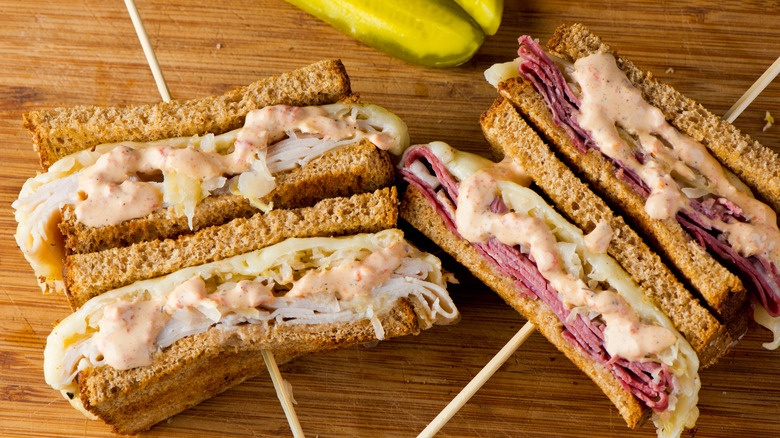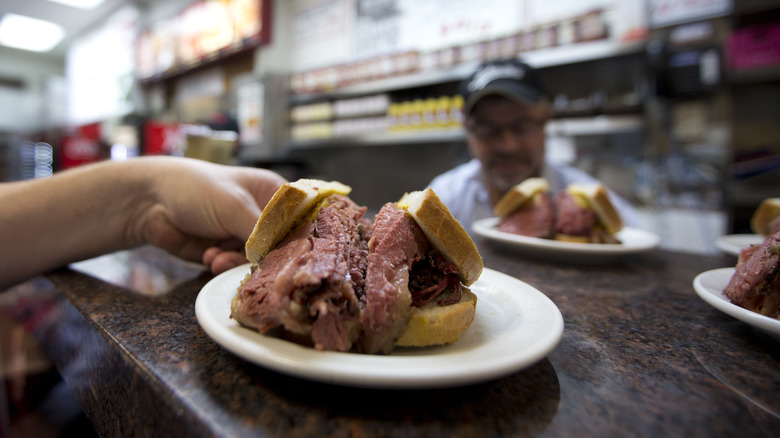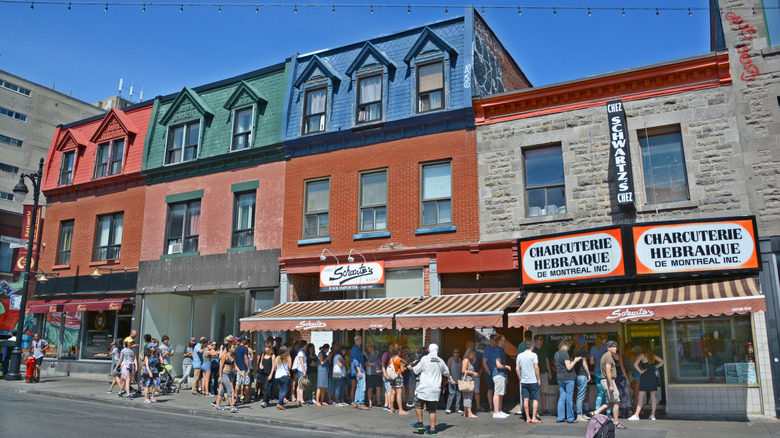Montreal Smoked Meat Is The Love Child Of Pastrami And Corned Beef
Smoked meat is but one reason among a handful of reasons to love Montreal — a city in Quebec, Canada. What makes a dish from one particular metropolis so special? The answer lies with its two immediate ancestors: pastrami and corned beef.
Pastrami, according to Fine Dining Lovers, is a beefy cold cut or deli meat typically made from the plate (the brisket's navel end), and sometimes from deckle, round, or short rib cuts. In general, it tends not to be too stringy. It's prepared by brining the meat in bay leaf, black pepper, clove, coriander, dill, juniper berry, salt, and sugar, then rubbing it with black pepper, coriander, fennel, garlic, mustard, salt, and sugar, which gives it a somewhat charred appearance. After that, it's dry-cured, smoked over hardwood, and either boiled or steamed before typically being served on a sandwich of mustard, pickles, rye, and sauerkraut. The preparation also pairs quite well with coleslaw, fries, matzo ball soup, and potato salad.
Corned beef, per The Pioneer Woman, is brisket cured in pink salt and spices like bay leaf, black peppercorn, coriander, juniper berry, and mustard. Afterward, it's boiled or slow-cooked, then served as a full roast alongside cabbage and potatoes or inside a Rueben sandwich with Thousand Island dressing. Alternatively, it can be used to make corned beef hash by pan-frying it alongside potatoes. Notably, corned beef tends to be a bit plainer than pastrami. Smash these two foods together, and what do you get?
What makes Montreal smoked meat unique
Montreal smoked meat has similarities to both pastrami and corned beef, but also enough differences to truly set it apart. According to Tourism Montreal, it is similarly dry-cured. Per Food & Wine, it's also a dish that — like both pastrami and corned beef — is brined (for a month at most), though sugar is often left out of the mix. Like pastrami it's smoked as well, but for a bit longer (up to 10 hours), and like corned beef, it's specifically made from brisket. As such, that smoky and fatty flavor shines on through, whether it's served cold, as a steamy entrée, or within a warm sandwich.
When ordering a Montreal smoked meat sandwich, you can expect it to be piled high on rye bread, smeared in yellow mustard, and topped with pickles (fries on the side). However, you can specify whether you want it lean (dry slices from the brisket flat), medium (lean and fatty pieces from the brisket's middle), or old-fashioned (medium and fatty pieces, thickly sliced). These sandwiches are sold not only in delis, but also at chain restaurants, corner diners, and fine-dining establishments, thus giving poutine and smokies a run for their money in terms of regional pride.
The Old World is a meaty inspiration
Montreal smoked meat shares a family history with both pastrami and corned beef. Pastrami, per TASTE, can trace its roots to the Ottoman Turks' "pastirma," a salty and spicy beef, goat, or mutton jerky developed as a way to preserve their food. That tradition made its way into Eastern Europe and was adopted by the Romanians for "pastrama" goose. When Romanians immigrated to the United States towards the end of the 1800s, they switched back to beef out of economic necessity and used weaker salt thanks to refrigeration.
Corned beef, on the other hand, originally comes from Ireland, according to the Encyclopedia Britannica. However, in the Irish olden days, beef was rare, so corned beef was prohibitively expensive for all but the rich. When Irish immigrants came over to the United States, though, they found that beef was quite affordable. The dish was then popularized as a result and is now a common St. Patrick's Day meal.
Montreal smoked meat is the result of Jewish people emigrating from Eastern Europe and immigrating to Canada (via Tourism Montreal). A few individuals have been proposed as the creator, like Benjamin Kravitz of Bens De Lux Delicatessen & Restaurant or Reuben Schwartz of the now famous Schwartz's and its smoked meat sandwiches. Yet, the earliest recorded purveyor of the dish seems to have been Aaron Sanft, who opened up Montreal's first kosher butcher shop. Where there's smoke, there's fire, and Montreal smoked meat is one hot dish!


